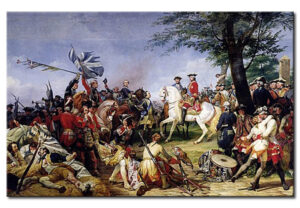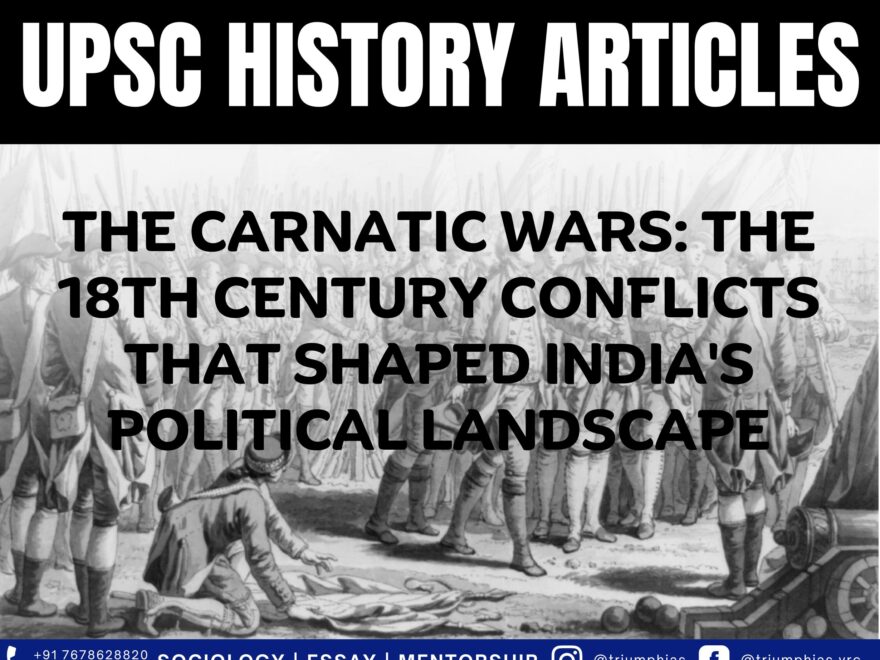The Carnatic Wars: The 18th Century Conflicts that Shaped India’s Political Landscape
(Relevant for Historical Section of General Studies Paper Prelims/Mains)

Carnatic Wars: 18 Century
The Carnatic Wars, occurring during the 18th century in South India, left a profound imprint on the region’s political scene. These conflicts encompassed a sequence of military engagements primarily involving the British East India Company, the French East India Company, as well as local entities like the Nawab of Arcot and the Marathas.
Carnatic wars
First Carnatic War (1746-1748):
- This conflict stemmed from the broader Anglo-French War in Europe ignited by the Austrian War of Succession.
- Engaged the French East India Company and the British East India Company.
- Came to a close with the ratification of the Treaty of Aix-la-Chapelle.
Second Carnatic War (1749-1754):
- The battleground was contested by rival contenders for the titles of the Nizam of Hyderabad and the Nawab of the Carnatic, each receiving backing from either the British or the French.
- The war reached its conclusion through the Treaty of Pondicherry, which curtailed French territorial aspirations.
Third Carnatic War (1757-1763):
- Led by Count de Lally and Sir Eyre Coote on the French and British sides, respectively.
- Witnessed British triumph and led to French retreat from India, establishing British supremacy.
- The Treaty of Paris in 1763 formally marked the cessation of hostilities.
How Carnatic wars shaped the political landscape of 18th century India
- The British East India Company emerged as the paramount European force in India subsequent to the conflicts, securing supremacy over crucial regions and trade pathways.
- The Third Carnatic War dealt a blow to the French East India Company, causing a wane in their sway and eventual relinquishment of certain areas. The indigenous realms, such as Carnatic, Mysore, and Hyderabad, became embroiled in the European power struggle.
- Their resources were depleted, armies were drained, and political equilibrium suffered. Triumphs achieved by the British in the Carnatic Wars set the stage for their dominion over India.
- Insights, territories, and alliances acquired propelled further expansion, culminating in British control over a substantial portion of the subcontinent. The Maratha Empire played a pivotal part in the Carnatic Wars, leveraging them to extend their influence beyond customary domains.
The Carnatic Wars reshaped the political landscape, with the British emerging as the dominant European power and setting the stage for future colonial rule. The French suffered setbacks and Indian powers weakened, establishing a precedent for European rivalries in India and laying the groundwork for transformation under British colonial rule.
To master these intricacies and fare well in the Sociology Optional Syllabus, aspiring sociologists might benefit from guidance by the Best Sociology Optional Teacher and participation in the Best Sociology Optional Coaching. These avenues provide comprehensive assistance, ensuring a solid understanding of sociology’s diverse methodologies and techniques.
Carnatic Wars, 18th Century India, British East India Company, French East India Company, Nawab of Arcot, Marathas, Nizam of Hyderabad, Treaty of Pondicherry, Treaty of Paris, Colonial Rule, First Carnatic War, Second Carnatic War, Third Carnatic War, Carnatic, Carnatic Wars,
Sample Question for UPSC Sociology Optional Paper:
- What were the major conflicts referred to as the Carnatic Wars?
Answer: The Carnatic Wars refer to a sequence of military engagements primarily involving the British East India Company, the French East India Company, the Nawab of Arcot, and the Marathas, occurring in the 18th century in South India.
- How did the First Carnatic War start?
Answer: The First Carnatic War stemmed from the broader Anglo-French War in Europe ignited by the Austrian War of Succession.
- What was the Treaty of Pondicherry?
Answer: The Treaty of Pondicherry marked the end of the Second Carnatic War and curtailed French territorial aspirations.
- Who were the leaders during the Third Carnatic War?
Answer: The Third Carnatic War was led by Count de Lally on the French side and Sir Eyre Coote on the British side.
- How did the Carnatic Wars impact the indigenous realms like Carnatic, Mysore, and Hyderabad?
Answer: Their resources were depleted, armies were drained, and political equilibrium suffered due to their embroilment in the European power struggle.
- What role did the Maratha Empire play?
Answer: The Maratha Empire played a pivotal part, leveraging the conflicts to extend their influence beyond customary domains.
- How did the Carnatic Wars set the stage for British colonial rule in India?
Answer: The British emerged as the dominant European power, securing supremacy over crucial regions and trade pathways, thus setting the stage for future colonial rule.
- Why did the French East India Company suffer setbacks?
Answer: The Third Carnatic War dealt a blow to the French East India Company, causing a wane in their sway and eventual relinquishment of certain areas.
- What implications did these wars have on the broader political landscape of 18th century India?
Answer: The wars reshaped the political landscape, establishing a precedent for European rivalries in India and laying the groundwork for transformation under British colonial rule.
Choose The Best Sociology Optional Teacher for IAS Preparation?
At the beginning of the journey for Civil Services Examination preparation, many students face a pivotal decision – selecting their optional subject. Questions such as “which optional subject is the best?” and “which optional subject is the most scoring?” frequently come to mind. Choosing the right optional subject, like choosing the best sociology optional teacher, is a subjective yet vital step that requires a thoughtful decision based on facts. A misstep in this crucial decision can indeed prove disastrous.
Ever since the exam pattern was revamped in 2013, the UPSC has eliminated the need for a second optional subject. Now, candidates have to choose only one optional subject for the UPSC Mains, which has two papers of 250 marks each. One of the compelling choices for many has been the sociology optional. However, it’s strongly advised to decide on your optional subject for mains well ahead of time to get sufficient time to complete the syllabus. After all, most students score similarly in General Studies Papers; it’s the score in the optional subject & essay that contributes significantly to the final selection.
“A sound strategy does not rely solely on the popular
Opinion of toppers or famous YouTubers cum teachers.”
It requires understanding one’s ability, interest, and the relevance of the subject, not just for the exam but also for life in general. Hence, when selecting the best sociology teacher, one must consider the usefulness of sociology optional coaching in General Studies, Essay, and Personality Test.
The choice of the optional subject should be based on objective criteria, such as the nature, scope, and size of the syllabus, uniformity and stability in the question pattern, relevance of the syllabic content in daily life in society, and the availability of study material and guidance. For example, choosing the best sociology optional coaching can ensure access to top-quality study materials and experienced teachers. Always remember, the approach of the UPSC optional subject differs from your academic studies of subjects. Therefore, before settling for sociology optional, you need to analyze the syllabus, previous years’ pattern, subject requirements (be it ideal, visionary, numerical, conceptual theoretical), and your comfort level with the subject.
This decision marks a critical point in your UPSC – CSE journey, potentially determining your success in a career in IAS/Civil Services. Therefore, it’s crucial to choose wisely, whether it’s the optional subject or the best sociology optional teacher. Always base your decision on accurate facts, and never let your emotional biases guide your choices. After all, the search for the best sociology optional coaching is about finding the perfect fit for your unique academic needs and aspirations.
To master these intricacies and fare well in the Sociology Optional Syllabus, aspiring sociologists might benefit from guidance by the Best Sociology Optional Teacher and participation in the Best Sociology Optional Coaching. These avenues provide comprehensive assistance, ensuring a solid understanding of sociology’s diverse methodologies and techniques. Sociology, Social theory, Best Sociology Optional Teacher, Best Sociology Optional Coaching, Sociology Optional Syllabus.
Best Sociology Optional Teacher, Sociology Syllabus, Sociology Optional, Sociology Optional Coaching, Best Sociology Optional Coaching, Best Sociology Teacher, Sociology Course, Sociology Teacher, Sociology Foundation, Sociology Foundation Course, Sociology Optional UPSC, Sociology for IAS,
Follow us :
🔎 https://www.instagram.com/triumphias
🔎https://www.youtube.com/c/TriumphIAS
https://t.me/VikashRanjanSociology
Find More Blogs
|
Scope of the subject and comparison with other social sciences |
|||
|
|
|
|
Modernity and social changes in Europe |

